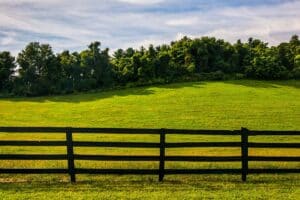As you can imagine, rural land agents field quite a few questions every day and many are regarding the value of a property. We hear comments such as “there must be gold buried on that property” quite frequently. While we do not take the comments personally, we do want to educate potential buyers and sellers on why and how each property is priced. Each property has a unique price because each property has a set of unique characteristics.
Whether you’re just beginning to navigate the land market, or if you’re an experienced buyer and seller, this article is for everyone who could use a refresher on the property value concept. We will also clarify some common misconceptions about property values.
Land values are like a trip to a self-serve yogurt shop.
That’s an analogy you weren’t expecting to hear. At many yogurt shops, there are endless options for sweetness and fun. You pick the flavor and all the toppings your heart could desire, then you pay based on the sum weight of the bowl. In essence, you are basically paying for the value (items) you add to the empty bowl. With every pour of yogurt and every topping that you add, you drive the price up. At the end, you pay the market value for that finished product.
Think about land the same way. With land, you essentially have a base value- or bare dirt value – that is determined by the current market conditions, location, and/or highest and best use that the property holds. This bare dirt value is often based off comparable sales or, if it is an income producing property such as tillable farmland or timberland, the bare dirt value is usually based on the soil quality. A property that has development potential will garner a higher price than a tract off the beaten path that will be used as a hunting getaway.
As you add value through both natural resource features such as timber, standing crops, and creeks, as well as man-made features such as a cabin or equipment shed, the price that property will garner will likely increase. Timber value varies depending on the age, species, and overall volume of timber on the property, as well as factors such as the proximity to timber mills and ease of access for future logging crews.
There are different ways to evaluate the worth of farmland acreage. The value of cropland is based on the productivity of the soil and average expected yields. Water features such as creeks, ponds, and rivers can add significant value, especially in states that have long been at the forefront of water issues.
And of course, wildlife density, trophy potential and quality of experience a hunting property offers a potential buyer is also a consideration. If a property has been well-managed for deer hunting and a new buyer can realistically walk in and immediately enjoy an exceptional hunting experience, that property will likely be more valuable than a property which has not been managed and a new buyer must invest time and money to realize its potential.
Real estate agents do not influence the market- sales do.
We’ve seen the comment “this brokerage is driving up the price of land” circulating on social media. It’s a popular opinion but is completely untrue. While real estate agents will certainly suggest a list price or accept a list price the seller suggests, only sales can truly affect land values because that is how comparable sale information is derived.
Comparable sale information is what appraisers use when developing a property value for a buyer, seller, or lender, depending on who requests the appraisal. Area sales of similar properties (i.e. land, acreage size, attributes) that have closed within the last 12 months are compiled to formulate a value consistent with the market. Appraisers do not look at the listed values of properties still on the market, or “what neighbor Johnny got for his farm”; appraisers look at at sales that most closely mirror the property being appraised.
Through their research, appraisers will have a strong idea of what attributes such as timber, water features, or structures will add to the bare dirt value of a property. Appraisers are typically able to cut through the emotion and nostalgia of a property that may be present with the seller and get to the bottom of what a property should bring in the current market. Real estate lenders require an appraisal before they approve a borrower for a loan, and many times a transaction will fall apart because a property did not appraise for an amount equal to or exceeding the price agreed upon between buyer and seller.
With that said, the main reason real estate agents do not influence property values is because a sale price is what a buyer is willing to pay and a seller willing to accept.
The sellers’ list price is more times than not a starting point for negotiations and not the final destination. In the current seller’s market, it’s common for buyers to offer full list price or above, but the realistic expectation is that a property should sell for 85-90% of the initial list price, so long as the initial list price is within current market boundaries.
It is the job of a land specialist to research land values of similar properties so that they can suggest a list price to the seller that will allow the seller to achieve their financial goals and keep the property within the realistic boundaries of the current market conditions. Properties that hit the market with unrealistic list prices often require repetitive price drops to bring the listing down to market value and reignite interest from buyers. When sellers overprice their property, they run the risk of attaching a negative stigma to the property. When a land specialist puts in the work on the front end and the seller trusts their professional advice, the seller will stand a far better chance of their property selling for a fair price within a reasonable amount of time.
For a buyer, it’s critical to work with a land specialist that invests the time to learn more about your goals and realistic expectations for a property. Land specialists help buyers narrow down their search to a few properties based on price parameters and desired features. A land specialist will then give their opinion of the value of each in order to decide upon an offer price- if you choose to make one.
Just like an unrealistic list price out of the gate can cause a seller to miss out on buyer interest, an unrealistic initial offer can have a similar effect. Low ball offers communicate tell a seller that you are not serious, and they may completely cut off communication with you and your land specialist. Making sure your offer is within a reasonable distance of the list price, that will allow room for negotiation without surpassing your budget, is important. If you’re in a balanced market or a seller’s market, you might make a list-price offer.
As we stated before, this is why a land specialist is important. Land specialists exist for a reason- because they understand the nuances that make land different than other types of real estate. Knowing the true values of these nuances can be the difference in a sold property or one that remains on the market.
Article contribution by Mossy Oak Properties. The Mossy Oak Properties land brokerage network was launched in 2003 and has since grown to over 100 franchised brokerages in 30 states throughout the country.
This content may not be used or reproduced in any manner whatsoever, in part or in whole, without written permission of LANDTHINK. Use of this content without permission is a violation of federal copyright law. The articles, posts, comments, opinions and information provided by LANDTHINK are for informational and research purposes only and DOES NOT substitute or coincide with the advice of an attorney, accountant, real estate broker or any other licensed real estate professional. LANDTHINK strongly advises visitors and readers to seek their own professional guidance and advice related to buying, investing in or selling real estate.










Add Comment